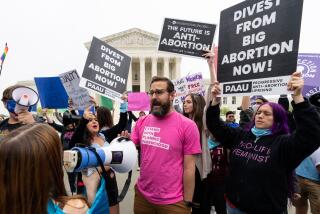Supreme Court rejects challenge to Obama stem cell policy
WASHINGTON -- The Supreme Court has turned away a challenge to President Obama’s policy of expanding government-funded research using embryonic stem cells that scientists say may offer hope for new treatments for spinal injuries and Parkinson’s disease.
The court’s action brings a quiet end to a lawsuit that briefly threatened to derail all funding for such research.
A federal judge in Washington in 2010 ordered the National Institutes of Health to halt funding of the research, citing a long-standing congressional ban on spending for research in which “human embryos are destroyed.”
But an appeals court overturned that order and ruled last year that the ban applied only to research which destroyed human embryos so as to obtain stem cells.
President George W. Bush in 2001 had allowed limited research on several stem cell lines that were already in existence. Upon taking office in 2009, President Obama went further and said NIH could conduct “scientifically worthy human stem cell research to the extent permitted by law.” Under guidelines issued by NIH, researchers can used stem line cells derived from donated frozen embryos that are no longer needed for fertility treatments.
The three-judge panel that upheld the Obama administration’s guidelines was made up Chief Judge David Sentelle, a Reagan appointee; Judge Karen Henderson, appointed by President George H.W. Bush; and Judge Janice Rogers Brown, an appointee of President George W. Bush.
Two researchers who work with adult stem lines, including Dr. James Sherley of the Boston Biomedical Research Institute, brought the lawsuit. They were represented by several groups, including the Law of Life Project. Samuel Casey, the group’s general counsel, called the human stem cell research “an ethical tragedy as well as a waste of the taxpayer’s money.”
They appealed to the high court in the fall, but the justices denied the appeal without comment or dissent in the case, Sherley v. Sebelius.
ALSO:
Web plays incendiary role in Ohio high school rape case
Tow line is attached to beached Shell oil barge off Alaska
Four people shot and killed inside Aurora, Colo., townhome
More to Read
Sign up for Essential California
The most important California stories and recommendations in your inbox every morning.
You may occasionally receive promotional content from the Los Angeles Times.











